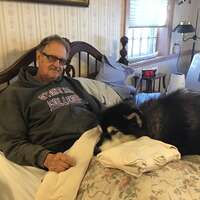Michelle's Journal
Mitral Regurgitation, Joined August 13, 2021
Mitral Regurgitation
Joined August 13, 2021
-
 I am from: Indianapolis, IN
I am from: Indianapolis, IN -
 My surgery date is: October 12, 2021
My surgery date is: October 12, 2021








Issues. Repair is always preferred over replace if possible and access to your heart can be accomplished in a few different ways. Robotic probably has the fastest recovery time due to smaller incisions. Splitting the sternum
The longest. I am also 79 years old and was very active and remain so. I’m sure you will get other responses with different opinions. I can only speak for myself.
I'll not sugar coat my reply. In general, it's not the operation's effect on your heart that will bother you. You probably won't feel any pain, for instance, emanating from inside your chest. However, if you've ever had a broken an arm or leg, even if you don't recall the initial discomfort to breaking the limb it's the application of the stabilizing cast plus managment of the healing process itself that will be pre-occupying. In other words, it's your broken sternum that will take some time to recover. The first days can feel pretty overwhelming but this operation is now so common that hospital staff are expert at closely monitoring your situation and are extremely helpful. They know it'll be tough, at first, to confidently take a deep breath in the first day or two but they can help with advice and encouragement and intervention if necessary. Recovery really needs your lungs to be working properly and your sternum is surgically protected so you can't possibly hurt yourself by breathing. They also know how important it is that you are up and walking around as soon as you can manage it. Getting on to your feet will present a challenge at first, but you'll very quickly learn how to roll and slide out of bed on your own and when your first accomplish this you'll feel like you just conquered Everest. You may be horrified by the sight of your incision when you first see it, and you probably won't like the scar it leaves behind. If the sight of it bothers you later, there are lots of cosmetic remedies available. Never bothered me. I always think of it as my Victory Scar.
How long it takes for your sternum to completely heal is pretty much up to you. Strenuous exercise or lifting objects, for instance, may set back the healing and add to the recovery time. Otherwise, within a few weeks you'll have resumed your normal activities and feeling much better than you have for years. You'll feel fully recovered within 6 months and by the one year anniversary the operation will have become a distant memory.
So, basically, if your life does not include heavy exercise, lifting, pushing, etc. then you should be able to take on most of your usual activities within 4 to 6 weeks and sensing the gratification of regaining much more energy.
There are a few new precautions in resuming your normal life, though. For instance, most members of the public, upon seeing a person with a broken leg or arm in a cast, will be careful to not even accidentally bump into them or push them. But there are few, if any members of the public who could consider that the person standing in front of them, with no obvious disabilty actually has a broken sternum. People rushing to get on the bus don't realize it or impatiently standing in line for some event don't consider it.. People wearing backpacks have no idea of the consequences of suddenly turning around in a crowded elevator. Yes, I speak from personal experience. LOL. Ouch!!! AVOID CROWDS, especially crowded elevators. (Good advice anyway, during the pandemic.)
In prep, I'd say, relax your mind and body. The benefits of this operation so outweigh the short period of discomfort involved, there is no point in worrying about it. Besides you'll probably find yourself needlessly requiring assurances that everything is going well AFTER the procedure so no point in using up the worry stores. My best advice to you is to hug all those who are near and dear to you now. Excessively, if they'll allow it. Because there's no denying it. Bear hugs will have to go on hold for awhile. That fact, if you ask me, was the only nearly intolerable part of my open heart procedure and the recovery from it.
Oh, did I mention? I'm 80 years old and my open heart operation was 10 years ago. I guess the necessary blood thinner regimen was a bother at first, but I eventually bought a home testing coagulation testing machine eliminates the need for frequent lab visits so that was a minor problem. Temporary discomforts are long gone. Even my Victory Scar can barely be seen anymore. I've encountered no disappointments whatsoever except I wish my AFIB had corrected itself, concurrent with the operation, as it does for some people.
My very best wishes to you as you embark on the same road, especially for your speedy recovery. Keep your eye on the destination, not temporary setbacks. The operation had a profoundly positive and persistent effect on my general health and on my heart health. You can confidently expect a similar or even better outcome for yourself.